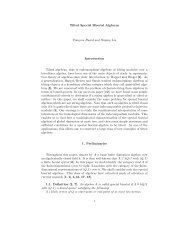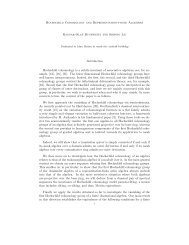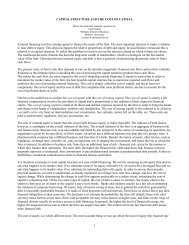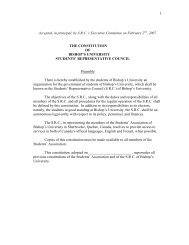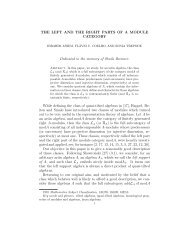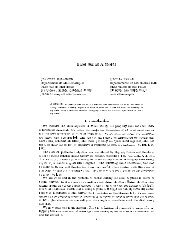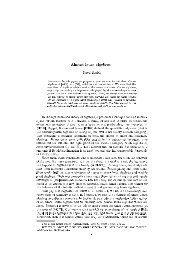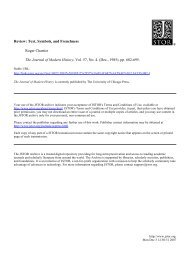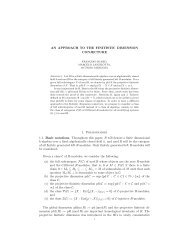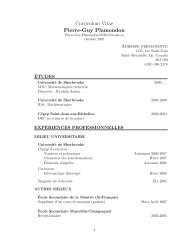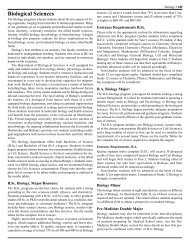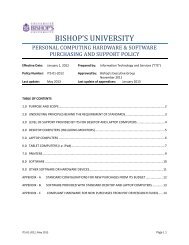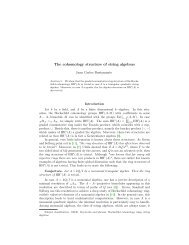Winter 2009 - Bishop's University
Winter 2009 - Bishop's University
Winter 2009 - Bishop's University
You also want an ePaper? Increase the reach of your titles
YUMPU automatically turns print PDFs into web optimized ePapers that Google loves.
Richard Florida is the author of<br />
numerous books, including the<br />
global best-seller The Rise of the<br />
Creative Class and Who's Your City?<br />
He is also a Professor of Business and<br />
Creativity at the Rotman School of<br />
Management, <strong>University</strong> of Toronto.<br />
Dr. Richard Florida<br />
The Donald Lecture Series, made possible by a generous<br />
donation from John Donald ’60, opened this season on<br />
October 17th when Dr. Richard Florida addressed an<br />
audience of 400. SRC President Mark Lawson noted “the Donald<br />
Lecture Series will bring speakers of national and international renown<br />
to campus to provide insight, provoke thought, and stimulate debate<br />
on compelling issues in the world today.” (Read about L.Gen The Hon.<br />
Roméo Dallaire (ret.), second speaker in the Donald Series, on p. 7.)<br />
Dr. Florida began by speaking unrehearsed about the merits of<br />
a liberal arts education. Having done his undergraduate degree at<br />
Rutgers College, he recalled how choosing a liberal arts education<br />
allowed him to follow his own intuition; his education at Rutgers did<br />
not cast him into a specific job, but instead gave him<br />
the ability to pursue his own research interests.<br />
His research calls into question the conventional<br />
wisdom that cities grow and prosper by attracting<br />
large companies that will provide jobs and by<br />
giving concessions such as tax breaks to attract<br />
major employers to an area. He says employees<br />
not companies drive and facilitate the economy. He believes the<br />
organization of the global economy is being transformed in the face<br />
of the failing American economy. Many intellectuals have already<br />
identified a forthcoming transition in the economy, calling it a “postindustrial<br />
economy” or even a “knowledge-based economy.” For<br />
Florida, the transition will be based on the creativity that is inherent<br />
in all people, a creativity found in the arts, research and university<br />
environments.<br />
The most creative cities have in abundance what Florida calls the<br />
three T's: technology, talent, and tolerance. And the single most<br />
important aspect for any leading creative centre is tolerance – of<br />
ethnicity, beliefs, orientations. Tolerance fosters an energy of diversity<br />
that stimulates creativity. Indeed, creativity demands diversity.<br />
Florida also made reference to the work of Jane Jacobs, a modern<br />
thinker who identified cities as the most important part of the<br />
economy, due to their ability to form communities of people in<br />
Florida combined analysis, a fascinating personal story, and<br />
self-deprecating humour in his presentation at <strong>Bishop's</strong>. It's no surprise<br />
Esquire Magazine has named him among the "Best and Brightest."<br />
"Tapping and stoking the<br />
creative furnace inside every<br />
human being is the great<br />
challenge of our time."<br />
productive environments. Innovation is born of a clustering of creative<br />
minds, a cluster effect which Florida believes is the product of a<br />
university atmosphere.<br />
Dr. Florida’s research has not been without controversy. While<br />
at Carnegie Mellon <strong>University</strong>, for instance, Florida worked with a<br />
graduate student and found that his own theories about tolerance were<br />
applicable to the student’s study of homosexuality in American cities.<br />
The most creative cities, thriving on the diversity of tolerance, are some<br />
of the gayest cities in America.<br />
This analysis created a righteous furore among American critics<br />
who accused Florida of pursuing a “gay agenda.” They said he sought<br />
to destroy the American family by highlighting the importance of<br />
the creative-minded individual and the educated<br />
as opposed to the labourer and his family, a<br />
demographic which, as Florida reminds us,<br />
represents less than a quarter of America’s working<br />
population. Although critics also accused him<br />
of undermining the Judeo-Christian fabric of<br />
America, Dr. Florida takes such criticism in stride.<br />
Florida ended his lecture by applying a special obligation to all<br />
universities. Universities often cordon themselves off from their<br />
surroundings and, in this way, become stagnant. To make surrounding<br />
populations feel connected, universities must make an attempt to be<br />
accessible to and active in their communities and thus facilitate the<br />
necessary creative clustering that drives the economy.<br />
The absence of class wars in our country means that Canada can<br />
conserve its human resources and efficiently augment its creative<br />
sector, and subsequently its economy, with the help of its class<br />
cohesion.<br />
In thanking Richard Florida for his stimulating and enlightening<br />
presentation, John Donald quoted from Florida’s book Cities and the<br />
Creative Class: “Tapping and stoking the creative furnace inside every<br />
human being is the great challenge of our time.”<br />
Tory Davis, 4th year English student<br />
and Copy/Online Editor, The Campus<br />
<strong>Winter</strong> <strong>2009</strong> Bishop’s <strong>University</strong> News • Page 11



